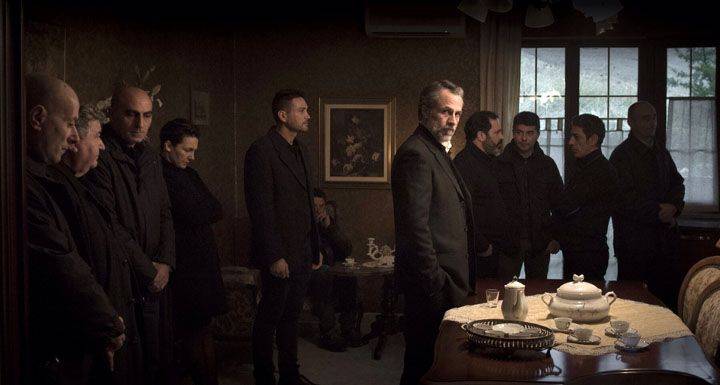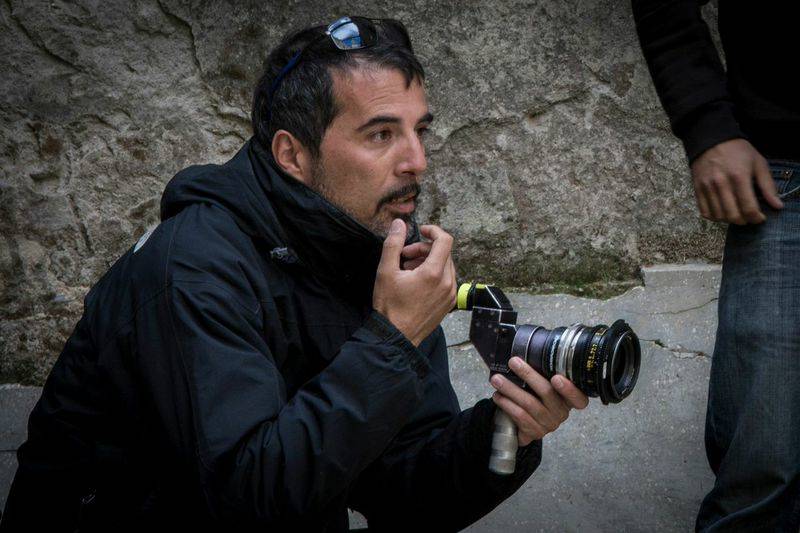Anime Nere: 'Ndrangheta, Family and the Past
What is more attractive: a life in the country herding goats and planting trees or a life in Milan, with money, drugs, and prostitutes? 20-year old Leo (Giuseppe Fumo) is definitely more into the latter and has little respect for his farmer father, Luciano (Fabrizio Ferracane) but idealizes his Mafioso uncles, Luigi (Marco Leonardi) and Rocco (Peppino Mazzotta). That's the premise of Black Souls, Anime Nere, a feature film directed by Francesco Munzi, that is opening in the New York, at the Angelika Fim Center on April 10. The film will open in Los Angeles on April 24th.
Based on real events described in Gioacchino Criaco’s novel, BLACK SOULS (ANIME NERE) is a tale of violence begetting violence and complex morality inherited by each generation in rural, ancient Calabria, a real- life mafia (‘Ndrangheta) seat in Southern Italy. The drama was selected to compete for the Golden Lion at the 71st Venice International Film festival. Black Souls was also an official selection of the 2014 Toronto International Film Festival and the 2015 Guadalajara International Film Festival.
“I made this film in a town that legal professionals and journalists stigmatize as one of the most mafia-ridden places in Italy, one of the nerve centers of the Calabrian ‘ndrangheta: Africo,” the director, Francesco Munzi, has stated.
“Africo, in the province of Reggio Calabria, on the Ionic coast, it has a beautiful coastline and is unknown to tourists. Rising up from the sea, are some of the most beautiful, untamed mountains in Italy – the Aspromonte.
The landscape is marked by the anarchic building developments so indicative of the south of Italy. When I said I wanted to make the film there, everyone tried to discourage me: it’s too difficult, it’s
inaccessible, it’s too dangerous.
It was an impossible film. I sought help from Gioacchino Criaco, author of Anime Nere, the book on which the film is loosely based. I arrived in Calabria full of prejudice and fear. I discovered a very complex and diverse reality. I saw mistrust turn into curiosity, and people opened their doors to us. I mixed my actors with the residents of Africo, who acted and worked with the cast. Without them, this film would not have been as rich. Africo has a very tough history of criminality, but it can help us understand many things about our country. From Africo, we have a better view of Italy.”
Variety calls it “This year’s mafia pic,” while The Telegraph gives it 4 stars and describes it as “Shades of GOMORRAH and THE GODFATHER.” “Anime Nere is far more than a gangster movie set in the Italian south: it becomes a morality tale about breaking cycles of violence and finding a new way. This is its true strength, and Munzi does a superb job of detailing the various forces at work. Dark and sinister, full of foreboding and twists, his elegant film tells the story of a man's struggle to escape his past with integrity and force,” has said Piers Handling of the Tornonto International film festival.
The Carbone family consists of three brothers, Luigi and Rocco, who are engaged in the family business of international drug trade, and Luciano who has remained in the ancestral town of Africo in the Aspromonte mountains on the Mediterranean coast, taking care of the land and his goats. His 20-year old son Leo shoots up a bar owned by a rival family with a longstanding blood feud with the Carbones. Leo's reckless actions create trouble that brings the whole family back to Africo for the inevitable bloody showdown.
Anime Nere is a story of “youth and experience, of father and son, brother against brother,” and most of all, of the past, a past that sooner or later comes back to knock at the door. “The past always returns,” Munzi himself has explained in the past, “It is something you cannot leave behind and the wife of one of the brothers, interpreted by Barbora Bobulova, realizes it when it's way too late. She knows the history of the family but she thinks it is something of the past.”
“I tell the story of a group of people who think they can create their own destiny but they do it in the wrong way, almost as a revenge: at first they are protectors but then they become the attackers.”








































i-Italy
Facebook
Google+
This work may not be reproduced, in whole or in part, without prior written permission.
Questo lavoro non può essere riprodotto, in tutto o in parte, senza permesso scritto.